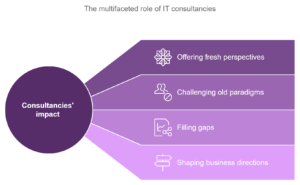AI priorities are shifting toward scalability, safety, and strategic use
The focus for AI in 2025 is on building for longevity. Businesses are tired of chasing flashy buzzwords that don’t deliver real results. Instead, they’re doubling down on systems that scale seamlessly and operate safely over time. This means AI isn’t only solving isolated problems anymore, but is actually becoming an integral part of a company’s future-proofing strategy.
Data governance is front and center because no matter how advanced the algorithms are, without reliable data, AI is just guesswork dressed up as innovation.
Companies that want to win in this game are investing in infrastructure that keeps data flowing efficiently and ethically across all their systems. This is where AI steps in, not as a standalone tool, but as more of a workhorse, quietly powering growth and decision-making behind the scenes. The challenge now is making AI systems robust, scalable, and safe enough to thrive within existing operations for years to come.
Clean, accessible data is critical for AI success
At its core, AI is only as good as the data it works with. Clean, organized, and accessible data is the foundation on which every successful AI initiative is built. Companies are realizing that scattered, poorly managed data simply won’t cut it anymore. Instead of pouring resources into custom-built solutions that quickly become obsolete, they’re leaning into platform-enabled environments. Why reinvent the wheel when modern platforms can deliver more for less?
This shift is about using what’s already on hand, smarter. Businesses are optimizing their current tools and integrating them with newer technologies to deliver maximum value. This approach reduces costs and speeds up deployment, because in a fast-moving world, agility trumps perfection.
Adapting skills, speed, and strategy to AI
To succeed in the age of AI, businesses need talent, agility, and integration. Cross-functional teams that combine software development, platform integration, and data management are a must-have. As technology grows more complex, specialists who only focus on a single piece of the puzzle struggle to keep up. Companies need teams that can think holistically, troubleshoot dynamically, and act decisively.
Despite the push for AI innovation, many organizations are stuck in the mud. Outdated processes and rigid structures slow down even the most skilled teams. Speed matters as much as expertise, but internal red tape often creates a bottleneck.
Here’s the catch though; companies need to equip their teams to work smarter and faster, and not try to solve this by simply hiring more. This is where consultancies come into play, offering fresh perspectives and challenging old paradigms. They fill gaps, and can shape how businesses move forward.

The multifaceted role of IT consultancies
That being said, even having the right talent and speed isn’t enough if AI remains an isolated initiative. AI must be embedded into core business operations. It’s not a novelty to parade around boardrooms, but a direct tool for optimizing workflows, reducing waste, and driving growth. The most successful companies integrate AI deeply into their day-to-day operations, treating it as a core part of the machinery rather than a shiny add-on.
At the same time, this transformation requires modern infrastructure. Legacy systems are dead weight, limiting scalability and agility. Migrating to cloud-native platforms like Databricks must be viewed as a strategic shift. Companies that make this move unlock real-time data processing and smarter decision-making, positioning themselves to compete in a fast-paced, data-driven world.
AI integration demands security, change, and precision
As businesses generate and store more data to power AI systems, security becomes a top priority. The risks grow alongside adoption, making it key to protect sensitive information with controls on AI/ML models and secure development practices. More than that, it’s also about creating trust—both within the organization and with customers. When data is treated as a valuable asset, it opens the door to innovation while keeping threats at bay.
Change management and upskilling are key to make sure employees are prepared for a world where AI drives decisions. Businesses must rethink workflows, reskill teams, and adopt new ways of working. Consultancies excel here, helping companies align technology with organizational design, so AI becomes a sustainable force for success.
This strategic shift doesn’t stop at internal processes. AI is also reshaping how businesses interact with customers. From loyalty programs to personalized experiences, AI-powered CRM solutions predict behavior and optimize every touchpoint.
Building long-term customer relationships isn’t as much of a guessing game as it has been in the past. Today, it’s a precise science driven by data and actionable insights.
Automation and partnership
Efficiency is the “name of the game”, and AI-powered automation is the main focus. Through taking over repetitive tasks, process intelligence reduces costs and frees up resources for high-impact work. Companies are doing more with less, building smarter workflows that eliminate inefficiencies and improve accuracy.
No organization can tackle this transformation alone, though. Consultancies are evolving from service providers to strategic partners, delivering solutions and co-creating long-term strategies aligned with business goals. This partnership model makes sure technology implementations are functional and transformational.
Final thoughts
The question isn’t whether you’ll adapt to this new era of AI and data-driven decision-making—it’s whether you’ll do it fast enough to stay ahead. Are you building systems today that can scale with tomorrow’s demands? Take a hard look at your infrastructure, talent, and strategy. Is your organization truly ready to lead, or are you just keeping pace? In a world moving this quickly, hesitation isn’t an option. What bold moves will you make to turn disruption into opportunity and position your brand as the one setting the standard for the future?





